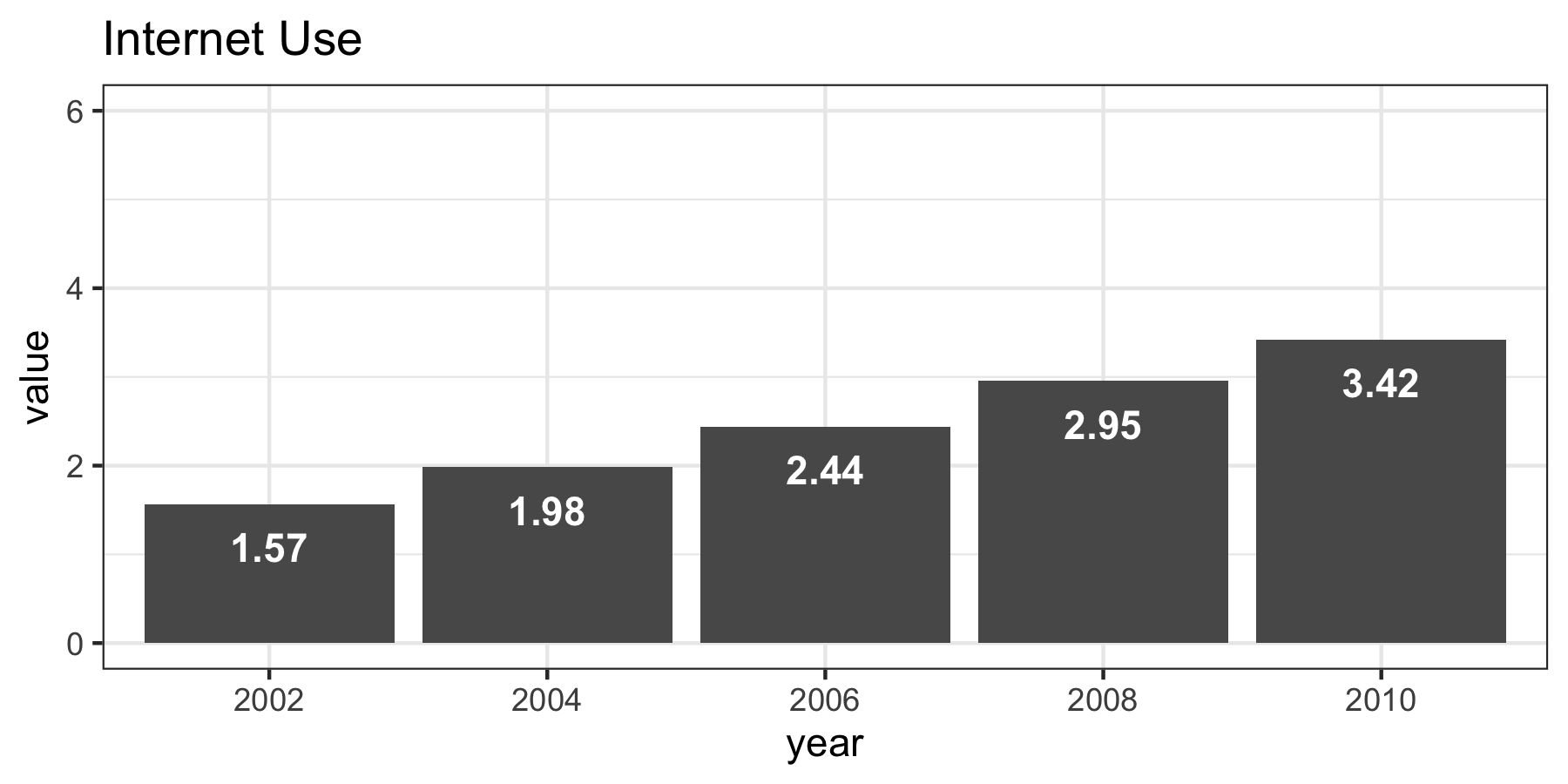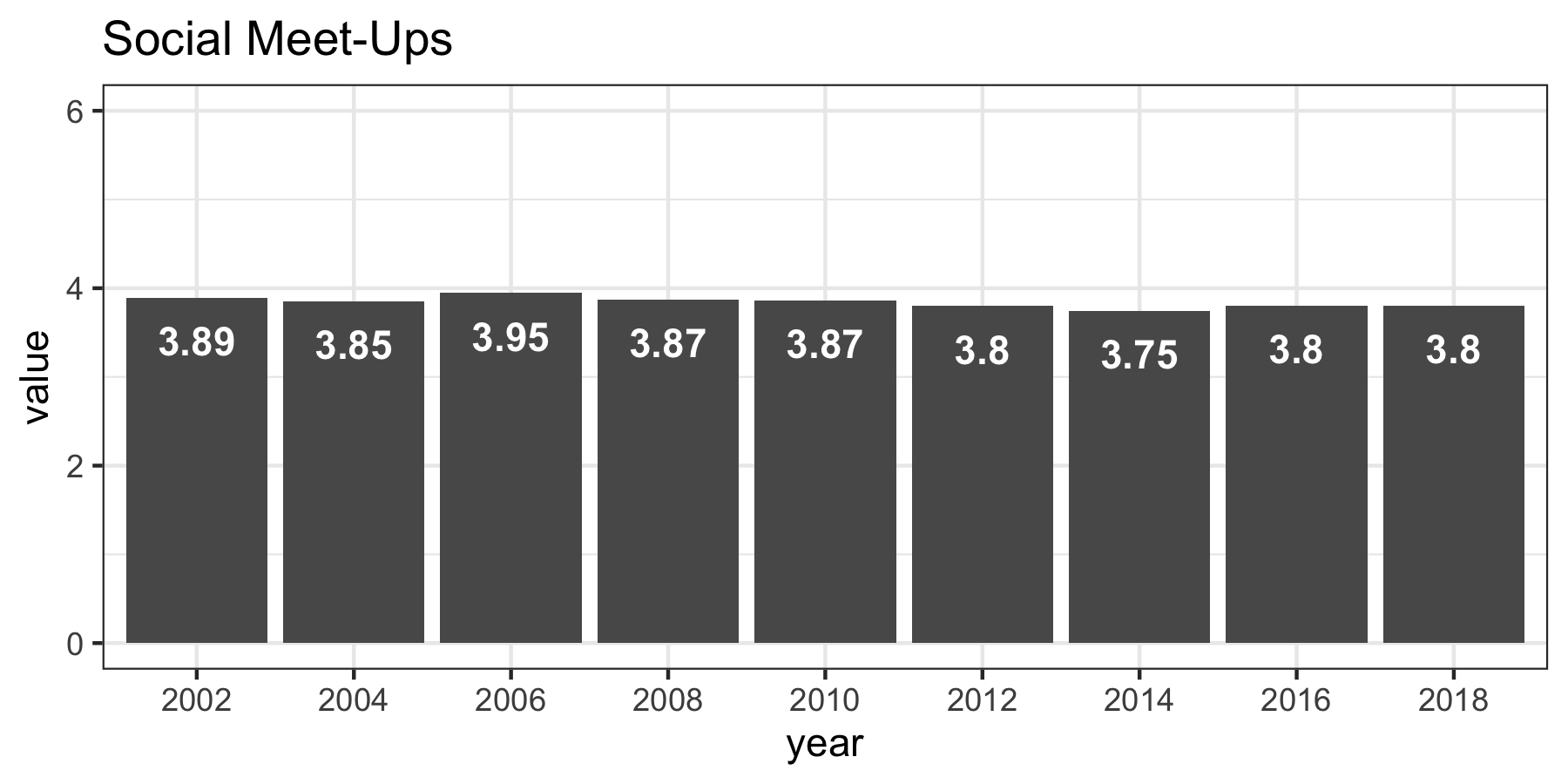Recently, there has been a lot of talk about the effects of smartphones on mental health. For example, one was able to read the following:
Rates of teen depression and suicide have skyrocketed since 2011. It’s not an exaggeration to describe iGen as being on the brink of the worst mental-health crisis in decades. Much of this deterioration can be traced to their phones.
Jean Twenge
Social media has been described as more addictive than cigarettes and alcohol.
Royal Society for Public Health
If you are a child in Kindergarten and the only you’re doing is swiping [on your phone], you will end up as cleaning staff.
Manfred Spitzer
Personally, my gut reaction to these statements is the following: they’re one-sided, sensationalist, and culture-pessimistic. They remind me of all those cases in which similar claims were staked regarding the deleterious effects of the more traditional forms of media, most of which eventually turned out to be wrong.
In Germany, for example, it was once claimed that reading fiction is dangerous and addictive — it even had a name, it was called Lesewut (i.e., reading frenzy). Specifically, after Goethe had published his widely successful The Sorrows of Young Werther, one could learn that “reading fiction has made as many families and people unhappy as the French Revolution” (Johann Heinzman).1
Recently, Amy Orben dug out a similar gem:
A debate recently took place between a brain specialist and an eminent physician as to the effect screen time had upon the brain. […] The brain specialist predicted that screens addicts will be represented in the insane asylums in the near future. There are a few already there. pic.twitter.com/AlvnBraMJF
— Amy Orben (@OrbenAmy) June 28, 2018
For me, the bashing of the new media culminated when I reviewed a paper that analyzed the relations between Internet use and communication. Granted, there were several things to like about the paper, but I was still taken aback by some particularly strident claims — for example, that Internet use would lead to the “social exclusion of non-users”. (To emphasize: It didn’t say more social exclusion, it said social exclusion. That’s rather absolute, normative, and non-qualified.) But I don’t want to go into too much detail here, the point I want to make is another.
The paper analyzed data from the European Social Survey. The ESS is a large trend study, respondents come from all EU countries, questions are about political opinions, media use, and happiness. Now, the point is that the ESS data are … publicly available to all researchers. So I thought: Hey, to find out how bad things really are, why not just run your own analyses … ?
Analyzing the ESS
First, in order to better understand what follows, please bear with me for some background information and some caveats. The ESS data collection began already in 2002 — which is great, because it means that we’ve got almost all major developments of the new media covered: the conception of Facebook (2004), the iPhone (2007), WhatsApp (2009), or Snapchat (2011). Currently, the data include the responses of more than 350,000 people, with collection taking place every second year, up until 2016 (2018 hasn’t been released yet).
For the subsequent analyses, my underlying research question was whether the average levels of happiness, health, or social activity have changed during all these years. Also, I’ve had a glimpse at the variables’ correlations.2
The code of all analyses is on my github — please feel free to use it, give feedback, or add some analyses of your own.
Next, there are some caveats. Being a trend study, the ESS includes the answers of different people at each wave. As a result, it is not possible to determine whether the potential changes are owed to within-person developments or to between-person differences. In other words, changes could be cohort effects. For example, people born in the early 20th century, who tend to drop out for natural reasons,3 might be less happy than people who drop in once they’ve reached the minimum age to participate (i.e., 15 years).4 Next, we also cannot detect causal effects — we can find only statistical correlations.5 Finally, although data quality itself is fine, some countries are not included in all waves, potentially introducing some artificial outliers.6 (I have by now reanalyzed the data using multi-level models, which can successfully address this problem; see section “Update”.)
But even given those two majors limitations, it’s still not too bad after all: If all we want to do is find out whether the overall level of happiness has changed in Europe between 2002 and 2016, the data are fine. So yes, we can answer the question of whether people have become less happy since the advent of smartphones. But no, we don’t know why that is or whether the happiness of individuals has changed as well.
The Development of Happiness et al.
Without further ado, let’s first have a look at changes in Internet use. People were asked regarding their “Personal use of internet/e-mail/www” on a 7-point scale ranging from 0 = never use/no access to 6 = daily. (Note that no data on Internet use was collected in 2012 and 2014, and that is was queried very differently in 2016, which is why I did not include these years.)

Results are straightforward: We find that Internet use has increased steadily.
Next, let us have a look at social activity. The ESS includes an item asking people how often they socially meet with friends, relatives or colleagues. People can answer on a 7-point scale (0 = never, 1 = less than once a month, 2 = once a month, 3 = several times a month, 4 = once a week, 5 = several times a week, 6 = everyday).

Interestingly, results showed that social meet-ups have, indeed, decreased slightly. Nothing huge, but still: it demonstrates that people tend to meet-up for social reasons slightly less frequently than usual.
Next, the ESS also has an item on whether people have “Anyone to discuss intimate and personal matters with”, with possible answers being yes or no.

Here, we see a somewhat different picture. The percentage of people who reported having someone to discuss personal matters with increased slightly. However, it has to be noted that the increase could also be due to changes in the answer format: Between 2012 – 2016, people had more options to choose from (precisely, instead of a binary yes/no, they could choose between none, one, two, …, ten or more). So put conservatively, the number of discussion partners of people did not decrease; instead, it might have even increased a bit.
Several people have claimed that smartphones cause psychological illnesses. Conveniently, the ESS includes the question whether people would be “Hampered in daily activities by illness/disability/infirmity/mental problem”. Answers ranged from 0 = no, 1 = yes to some extent, 2 = yes a lot.

Results showed that there was not a lot of change with regard to health problems. There was a tiny increase between the years of 2002 and 2006, after which it stayed mostly the same. Specifically, health problems remained remarkably stable in the last 10 years.
But what about general health? Have people become more or less healthy? Respondents were asked to rate their subjective general health on a 5-point scale, ranging from 0 = very bad to 4 = very good.

Again, the level of health remained mostly the same, there was not a lot of change. Maybe a slight dip in 2006 and a tenuous increase in 2014, but that’s about it.
Finally, the central and maybe most relevant question: Have people become more or less happy … ? Respondents were asked to rate their happiness on a 11-point scale, ranging from 0 = extremely unhappy to 10 = extremely happy. Here are the results:

Again, we see that levels of happiness did not change substantially across the last 16 years. There was a slight dip in 2006 and 2008 and a slight increase in 2014 — but, really, there is not an awful lot of change overall. In conclusion, although there might have been some minor shifts, the overall level of happiness did not change substantially since the advent of smartphones.
Some might retort: Well, maybe not on the overall level. But what about our kids? It’s the younger ones who are using the Internet, they have to bear the brunt. Hence, I have rerun all calculations for people up to 25 years, and all I can say is: The kids are alright.

Update
Also when analyzed using multi-level model, the results remain mostly the same. For what it’s worth, they become more even more pronounced …

Correlations
As mentioned above, I’ve also analyzed the variables’ correlations. So when pooling the data of all years, we can find the following pattern.
| netuse | happy | sclmeet | inmdisc | health | hlthhmp | |
|---|---|---|---|---|---|---|
| Internet Use | 1.00 | 0.22 | 0.23 | 0.16 | 0.34 | -0.23 |
| Happiness | 0.22 | 1.00 | 0.23 | 0.19 | 0.36 | -0.21 |
| Social Meet-Ups | 0.23 | 0.23 | 1.00 | 0.17 | 0.21 | -0.14 |
| Intimate Discussion Partners | 0.16 | 0.19 | 0.17 | 1.00 | 0.14 | -0.10 |
| Health | 0.34 | 0.36 | 0.21 | 0.14 | 1.00 | -0.58 |
| Health Problems | -0.23 | -0.21 | -0.14 | -0.10 | -0.58 | 1.00 |
In other words, people who use the Internet more frequently than others are …
- … moderately more happy.
- … meet others for social events a bit more frequently.
- … are slightly more likely to have a person with whom to discuss intimate topics.
- … are considerably more healthy.
- … have slightly less health problems.
This might paint a somewhat rosy picture of Internet use, but, again, these correlations don’t imply causations. It’s important to note that they are largely determined by other third variables such as income, education, or GDP.7
Conclusion
To conclude, what did we find? I would say that with regard to mental health, there hasn’t been a lot of change. To me, this is important: Learning that some things haven’t changed can be just as insightful as learning that some things have changed. Intuitively, we tend to overestimate the effects of the Internet, smartphones, or social media on our mental health. Empirically, however, the effects we find (if any) are often small and borderline negligible. Our mental health is determined by a plethora of factors: Above all, and maybe somewhat counterintuitively, it’s genetics.8
Furthermore, there are candidates such as physical health, social embeddedness, financial ressources, employment, etc. Media might also play a role, yes, but it is tertiary. Its overall potential is, by definition, capped.
Right, but if we want to speculate about potential causes of the (small) fluctuations in happiness, there are some alternative hypotheses. For example, the dip in 2008 happens to correspond to the global financial crisis, which started in 2007, and to the European debt crisis, which manifested in 2009. Especially in Greece, the economy plummeted and levels of happiness decreased.9 Likewise, the small dip in happiness in 2016 might correspond to the European refugee crises, which was met with a lot of political unrest, potentially having left a mark on overall happiness. In the end, on the basis of these data we cannot know. However, even in these years happiness decreased only slightly.
To be perfectly clear: Yes, there are ways of using a smartphone that can negatively impact mental health. Personally, I pay attention not to use my phone too much and to have times when I’m offline. I have turned off some particularly pesky push-notifications and deleted some tremendously time-trenching apps. However, I also use my phone to listen to podcasts, to exchange pictures with friends and family, or to read blog posts — things that I feel enrich my life deeply. In other words: Not all screen-time is created equal.
Currently, we are still lacking the data to effectively test whether smartphones are, in the grand scheme of things, good or bad. But even if the overall effect should turn out to be negative — which could be — I would still be very surprised if it was particularly strong. To sum up, I think there are two major take-aways:
Extraordinary claims require extraordinary evidence. Saying that we are facing “the worst mental-health crisis in decades” is an extraordinary claim. However, it has one problem: It lacks the extraordinary evidence.
In the end, the effects of smartphones are comparable to those of all the other good stuff that exists, such as food, sports, sex, games, transport, or work: Their effects depend on how we use them, how much we use them, or when we use them. The Internet, smartphones, or social media aren’t challenging because they’re so bad, they’re challenging because they’re so good.
Footnotes
- Thanks to Johannes Breuer for bringing the topic of Lesewut back to mind!
- Please note that you won’t find any p-values here. The data are humongous, so even minor differences/correlations would be significant. Instead, I simply look at the variables’ means on the original scaling and the usual effect sizes of correlations. Also, as recommended by the ESS, I’ve weighted the data (specifically, by multiplication of the d-weight and the p-weight).
- I mean, well, they quite literally die.
- And it seems apparent that people who have went through WW2 differ significantly from those who have grown up in the abundance of today’s world.
- Which we can then, of course, harness to embark on some wild and arbitrary speculations regarding causality
- For example, the data for Greece are missing between 2012 and 2016, which might lead us to hypothesize that there is a slight overestimation in happiness for these years.
- If you want to know how strongly exactly, feel free to add these analyses to the script
- Brown, N., & Rohrer, J. (2018). Re-slicing the “happiness pie”: A re-examination of the determinants of well-being. doi:10.17605/OSF.IO/QV85G
- As evidenced by the world happiness report (Brown & Rohrer, 2018).

This is a pretty good blogpost on the topic. I wrote something specifically about smartphones, a while back, as well. I think the biggest problem within this topic is that people do not take apart internet use. Social media as a sole internet use differs dramatically from internet use as email usage, news and youtube consumption. Facebook, Twitter, G+ etc. are kind of a category of its own, due to their users’ tendency to display only positive data. There is literature about the negative effects of social media on mental well-being. I will leave a link to my comment here, just in case I missed something: https://neuromonocyt.wordpress.com/2018/03/16/the_imitation_game/
https://waterfallmagazine.com
I am genuinely glad to glance at this weblog posts
which carries lots of helpful facts, thanks for providing such statistics.